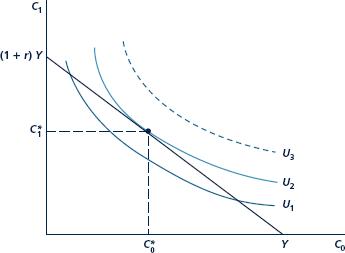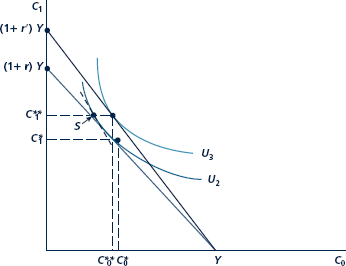
Intermediate Microeconomics and Its Application 12th Edition by Walter Nicholson,Christopher Snyder
Edition 12ISBN: 978-1133189022
Intermediate Microeconomics and Its Application 12th Edition by Walter Nicholson,Christopher Snyder
Edition 12ISBN: 978-1133189022 Exercise 30
One way to study the results of Figure and Figure is by thinking about the ''relative price'' of C 1 in terms of C 0.
1. Explain why the relative price of C 1 is give by 1/(1 + r ). If r = 0.10, what is the relative price of C1? Explain the meaning of this ''price.''
2. Explain why an increase in r increases the relative price of C 0. Why is the individual's reaction to such a price increase ambiguous here, whereas that was not the case in Chapter 3?
Figure The Savings Decision
A person with a current income of Y can either spend this on current consumption, C 0 , or save it (at an interest rate of r ) to buy consumption next year, C 1. Here, the person?s utilitymaximizing choice is C * 0 , C * 1. Current savings are Y * 0.
Figure Effect of an Increase in r on Savings Is Ambiguous
An increase in r to r? causes a substitution effect that reduces C 0 from C * 0 to S (an increase in savings) and an income effect that raises C 0 from S to C ** 0 (a decrease in savings). In the figure, the rise in r results in a net increase in savings.
1. Explain why the relative price of C 1 is give by 1/(1 + r ). If r = 0.10, what is the relative price of C1? Explain the meaning of this ''price.''
2. Explain why an increase in r increases the relative price of C 0. Why is the individual's reaction to such a price increase ambiguous here, whereas that was not the case in Chapter 3?
Figure The Savings Decision

A person with a current income of Y can either spend this on current consumption, C 0 , or save it (at an interest rate of r ) to buy consumption next year, C 1. Here, the person?s utilitymaximizing choice is C * 0 , C * 1. Current savings are Y * 0.
Figure Effect of an Increase in r on Savings Is Ambiguous

An increase in r to r? causes a substitution effect that reduces C 0 from C * 0 to S (an increase in savings) and an income effect that raises C 0 from S to C ** 0 (a decrease in savings). In the figure, the rise in r results in a net increase in savings.
Explanation
1) On the basis of the information given...
Intermediate Microeconomics and Its Application 12th Edition by Walter Nicholson,Christopher Snyder
Why don’t you like this exercise?
Other Minimum 8 character and maximum 255 character
Character 255



